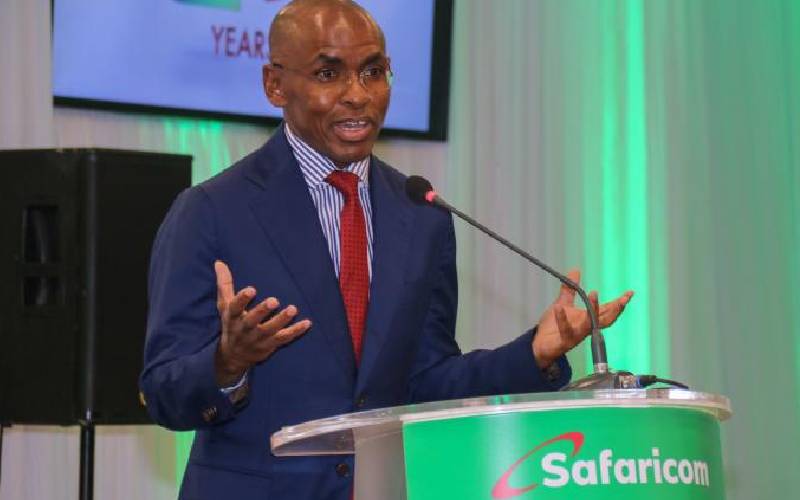Safaricom Chief Executive Officer Peter Ndegwa. [Wilberforce Okwiri,Standard] Mobile phone operator Safaricom is indisputably the most profitable company in Eastern and Central Africa.
No company comes close to the telco, which recently made an incursion into Ethiopia after Addis Ababa liberalised its telecommunications sector.
Yet, Safaricom’s dominance does not end in the goods and services market but also stretches into the financial market. READ MORE
Safaricom, which is majority-owned by South Africa’s Vodacom and United Kingdom’s Vodafone, controls over 58 per cent of the market capitalisation, or the total wealth, at Nairobi Securities Exchange (NSE), which was valued at Sh2.78 trillion at the close of the market last Friday.
This means that the remaining 64 listed companies at the Nairobi bourse share amongst themselves a paltry Sh1.09 billion. Safaricom’s dominance is not accidental. The telco issued 40 billion of its shares to the public in 2008 at a price of Sh5. But years of phenomenal growth driven by decent profits have seen Safaricom’s share price rise more than eight-fold to trade at Sh43.
Now, Safaricom’s success is making investors, especially insurance companies and pension funds jittery.
Although Safaricom has generally been robust, public watchdogs are wary of such extreme cases of concentration should a company go bust. This dominance has elicited sharp reactions from various experts, with some calling out the NSE for failing to mobilise investors to the bourse.
“There is nothing NSE is doing in my opinion. Because they need to do more work to enrol more companies to reduce that dominance,” said Ezekiel Macharia, the chief executive of Kenbright Holdings, a risk advisory company.
Mr Macharia, an actuary, now wants regulations within the Retirement Benefits Act and Insurance Act changed to protect funds belonging to pensioners and policyholders respectively from being exposed to just one stock such as Safaricom’s.
Normally, investors will use indices such as the NSE-20, which is the benchmark index for the 20 most valuable stocks or NASI, the All-Share Index.
But Safaricom controls a huge chunk of the NSE-20 index. And if you add stocks for Equity, KCB and East African Breweries, then you have something akin to an NSE-4.“I suggest they (regulators) create a new index without Safaricom so that we see the true performance of this stock market because what we are just tracking is the Safaricom index,” said Macharia.To protect the public, the regulators do not allow insurance companies and pension funds to put all your money in […]
